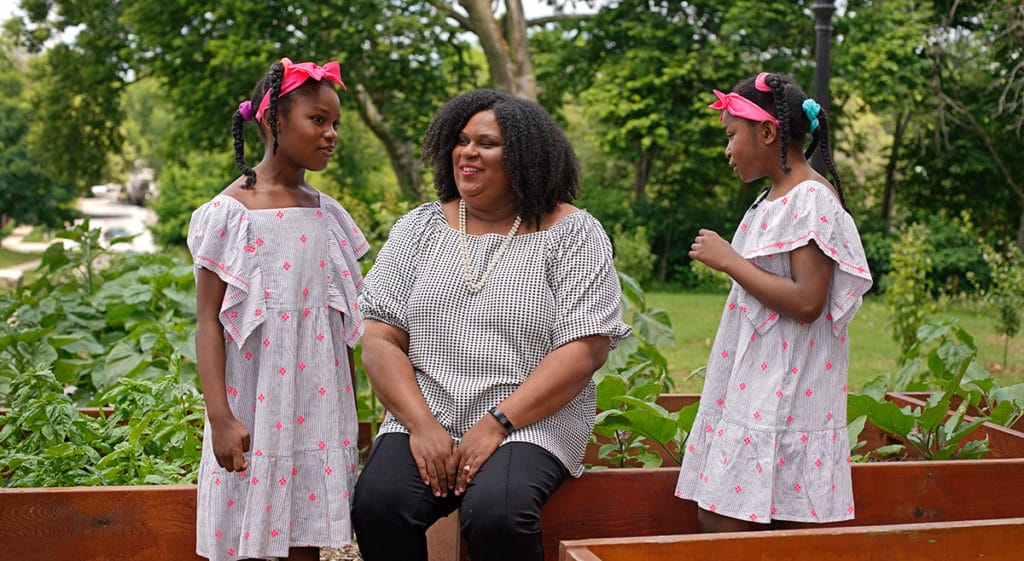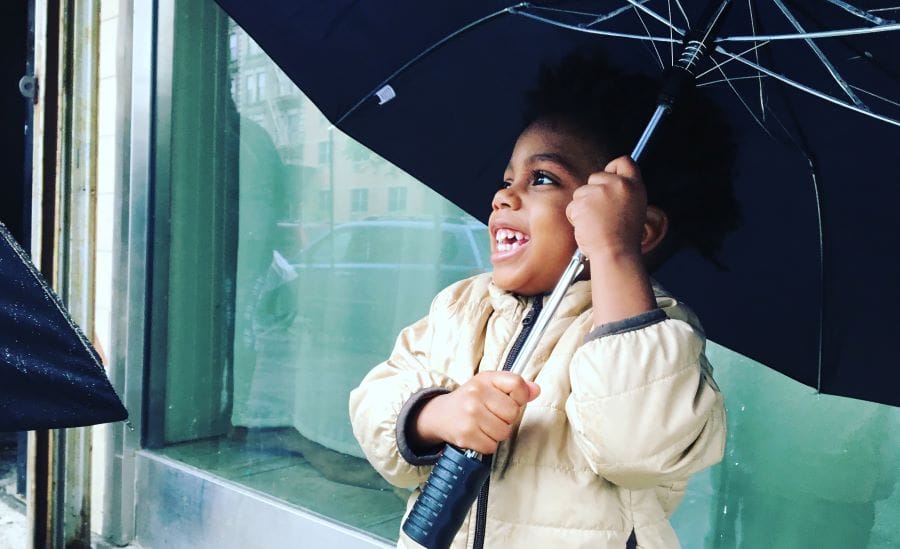Let us tell you the stories of the individuals behind three small food allergy nonprofits that are making a big difference. The nonprofits are: Food Equality Initiative, Elijah-Alavi Foundation and Red Sneakers for Oakley. Food Equality Initiative, Elijah-Alavi Foundation and Red Sneakers for Oakley. These founders stand out for their above-and-beyond dedication to improving the lives of those with severe food allergies. Plus, learn how you can help their efforts.

Food Equality Initiative
Emily Brown is the founder and CEO of the Food Equality Initiative (FEI). The Kansas City-based nonprofit works to improve health and end hunger among families who require allergy-friendly foods, but struggle to afford them.
FEI improves access to safe foods, educates its clientele allergy management, and lobbies for federal food assistance programs to increase allergy-friendly options.
THE STORY
When you live with food allergies or celiac disease, Emily Brown stresses that sticking strictly to foods which are safe for your condition is the first line of health care. Quite literally, “food is medicine,” she says.
When she founded Food Equality Initiative in 2015, she knew from her own experience that food pantries offered precious little for those grappling with food allergies and financial difficulty. (In a memorable 2014 visit to one pantry, the only safe food Brown found was two potatoes and a jar of salsa.) “Food access is extremely important. And without it, we see disparities that run along racial and economic lines,” she says.
When the shutdown orders of the pandemic hit in late March 2020, Brown witnessed the enormity of the need for allergy-friendly food among those facing food insecurity. Messages came flooding into FEI. People were saying, “I just got laid off and I’m worried about how we can get safe food.” FEI’s client base grew by 240 percent – “it was almost immediate.”
The nonprofit had been in the process of switching from an in-person food pantry to a system where clients get $155 a month to shop in an online marketplace, and then the order would be delivered. With the 2020 pandemic rules, suddenly that transition was in overdrive.
“We had two weeks to do it, since we didn’t want anyone to lose service,” Brown says. FEI’s staff worked around the clock and funds were stretched to the limit. But they did it.
While the job picture improved through 2021, Brown says the needs for those with food insecurity won’t get better overnight. Plus, the funding she has is largely directed at serving the states of Kansas and Missouri. Today, she sees requests pouring in from all over the United States, and knows that the work FEI does must expand.
“We have a national wait-list,” says Brown. “Some of that is families. But it also comes from hospitals, dietitians, social workers, allergists and GI specialists. They call and say, ‘we have patients who are food insecure, can you help us?’”
WORK AHEAD
Brown is undertaking an ambitious effort to solve the national allergy pantry wait-list issue. Rather than try to recreate an FEI in every major city, she’s focused on raising $500,000 to test a pilot program in which an FEI presence would be embedded in five children’s hospitals. With her nonprofit’s funding assistance, a hospital would hire a coordinator to work with primary care and allergy departments to identify patients in need. The patients would be registered on FEI’s online marketplace and given support with food allergy management. “When I think of who could actually sustain our program over time, I think it’s the children’s hospitals,” she says.
As well, she’s pressing the case for food subsidy programs like WIC (Women, Infants, Children) to include allergen-free substitutes for foods of similar nature. For instance, WIC offers beans as a substitute for peanut butter. (Not so appealing for sandwiches.) While more expensive, she’d like to see allergy-friendly alternative butters on the list.
HOW TO HELP
Donate to here to help FEI provide the fast-rising number food allergy families in need with safe and healthy food.

Elijah Alavi-Foundation
Thomas Silvera and Dina Hawthorne-Silvera are the co-founders of the Elijah-Alavi Foundation (EAF). The nonprofit is named after the Silveras’ son Elijah, who tragically died in November 2017 following an anaphylactic reaction at his New York City daycare.
EAF aims to bring food allergy training and awareness to all levels of school and childcare, through Elijah’s Law bills at the state level. New York was the first state to pass Elijah’s Law (in 2019), Illinois followed suit (in August 2021) and interest is building in other states.
The New York law, which is the model, extends food allergy protocols in K-12 schools to all daycares and preschools, and requires state guidelines for the prevention of and response to anaphylaxis. EAF is also a partner on an accredited food allergy training program for schools and daycares.
THE STORY
The Silveras launched their foundation with a mission to improve and require food allergy education and readiness in U.S. daycare and school programs. Their son Elijah died after a daycare employee fed him a grilled cheese sandwich, despite the 3-year-old’s known severe allergy to dairy. “What happened to our son, we don’t want that to happen to another child,” says Thomas, the nonprofit’s president and CEO.

They are working to ensure: all staff in charge of daycare and school-age children know the symptoms of anaphylaxis and how to treat it, with emphasis placed on ensuring underserved communities are part of the training program.
In the spring of 2021, an Elijah’s Law bill (HB0102) was passed in the Illinois House of Representatives. It next passed the Senate and, Governor J.B. Pritzer signed it into law on Aug. 20, 2021.
“This is a big deal, not just for my family, but for the food allergy community,” says Silvera. “It’s so important, and that’s why we’re working tirelessly to implement these bills in so many different states.”
WORK AHEAD
There’s an Elijah’s Law bill now in the works in Pennsylvania. Plus, Silvera is collaborating with a team from Massachusetts, and he’s assisting a California advocate who’s working with legislators there. As well, the foundation is working with the Asthma and Allergy Foundation of America (AAFA) to investigate bills in Missouri and Alaska, along with more states on the radar.
The workload of the Silveras (who have full-time jobs) is challenging. But Thomas credits the community for their support. “That’s what I love about this community. We are better together when we are standing on that same soapbox.”
HOW TO HELP
Donate here to support the foundation’s work. Interested in advocating to get an Elijah’s Law in your state? Then contact Silvera at: [email protected].
“I want people to reach out,” he says. “I will hand them my talking points and things that we’ve done in other states, and also the existing guidance for their state to see the difference in having Elijah’s Law implemented in their home state.”

Red Sneakers for Oakley
Oakley Debbs, who died of anaphylaxis at age 11, is the inspiration for Red Sneakers for Oakley (RSFO) – the nonprofit founded by his parents Robert and Merrill Debbs.
Oakley was an honors student and gifted athlete who loved to wear red sneakers. After the tragedy, his family turned “red sneakers” into a symbol for raising awareness of the seriousness of anaphylaxis and the need to use epinephrine quickly.
THE STORY
The Debbs founded RSFO out of the desire to educate and save lives. The couple says they were never fully informed by doctors that Oakley’s so-called “mild nut allergy” had the potential to turn severe. Nor did they appreciate the need to use epinephrine right away in a reaction. Through RSFO, the Debbs share Oakley’s story to educate schools, the food allergy community and the public to understand to be prepared because – food allergies can be life-threatening.
They have a special day on the calendar – May 20 is International Red Sneakers Day. It has become a global social media event and involves people posting photos wearing red shoes in honor of Oakley and allergy awareness.

As of 2021, it’s also an official day on the National Calendar. For the two-week period surrounding May 20, 2021, the campaign reached a record 9.4 million people.
Oakley’s story has resonated with so many. Merrill Debbs continuously receives testimonials from people like this allergy mom who wrote: “I do believe Oakley’s story contributed to saving my son’s life as we were able to recognize the signs and knew what to do.”
Not long after Oakley’s passing, Merrill told me: “This child of mine, he was a rock star, a good, good kid. So that’s a big part of my driving force – the legacy of Oakley.”
WORK AHEAD
The Debbs continue their work to grow the annual International Red Sneakers Day. In addition, RSFO offers school initiatives and developed a Food Allergy Awareness Handbook for those looking to advocate in their communities. Recently, the nonprofit launched three educational programs for teens and tweens. And more programming is in the works.
HOW TO HELP
Inquire about holding a Red Sneakers Day at your school or with your team. Donate to support the work of Red Sneakers for Oakley here.
This updated article is reprinted from Allergic Living’s “Our Stories, Our Strength e-magazine, which features many great first-person articles from the food allergy community.
Related Reading:
Holes in the Safety Net for Food Allergy Families
Illinois Gov. Signs Elijah’s Law, Protecting Allergic Kids in Daycare, School
Red Sneakers Day Steps Up Its Impact, as May 20 Gains Calendar Status





